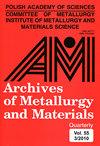利用晶体塑性理论对等通道角挤压 (ECAP) 进行多尺度混合数值模拟
IF 0.7
4区 材料科学
Q4 METALLURGY & METALLURGICAL ENGINEERING
引用次数: 0
摘要
EcAP 的有限元模拟包括加工过程中的实际条件--挤压金属与模壁之间的摩擦,以及沟道的滚圆,在宏观和微观两个尺度上进行。宏观分析是使用 UMAT 用户材料程序对具有非线性硬化的同位素材料进行的。这里采用的是纯拉格朗日方法。在每个计算步骤中都记录了所选有限元的应力、应变及其增量,以及变形梯度张量。然后将宏观有限元分析中获得的位移作为多晶结构的运动输入。对于面心立方结构,这里将位错滑移作为塑性变形的来源。使用晶体塑性得到的结果显示,材料内部的应力和应变分布不均匀,这与晶粒的各向异性有关。微观和宏观尺度的结果是一致的。有限元分析表明了应用晶体塑性方法解决包括材料成型过程在内的弹塑性问题的潜力。本文章由计算机程序翻译,如有差异,请以英文原文为准。
Hybrid, Multiscale Numerical Simulations of the Equal Channel Angular Pressing (ECAP) using the Crystal Plasticity Theory
The FEM simulations of the EcAP including real conditions of the process – the friction between the metal extruded and the die walls, as well as, the channels rounding, were done here in two scales – macro-and micro-. The macroscopic analyses were done for isotopic material with a non-linear hardening using the UMAT user material procedure. The pure Lagrangian approach was applied here. The stress, strains and their increments, as well as, the deformation gradient tensor were recorded for selected finite elements in each calculation step. The displacements obtained in the macroscopic FEM analysis are then used as the kinematic input for the polycrystalline structure. The dislocation slip was included as the source of the plastic deformation here for the face-centered cubic structure. The results obtained with the use of the crystal plasticity show the heterogeneous distribution of stress and strain within the material associated with the grains anisotropy. The results in both micro-and macro-scales are coincident. The FEM analyses show the potential of the application of the crystal plasticity approach for solving elastic-plastic problems including the material forming processes.
求助全文
通过发布文献求助,成功后即可免费获取论文全文。
去求助
来源期刊

Archives of Metallurgy and Materials
工程技术-冶金工程
CiteScore
1.20
自引率
0.00%
发文量
0
审稿时长
4.5 months
期刊介绍:
The Archives of Metallurgy and Materials is covered in the following Institute for Scientific Information products: SciSearch (the Science Citation Index - Expanded), Research Alert, Materials Science Citation Index, and Current Contents / Engineering, Computing and Technology.
Articles published in the Archives of Metallurgy and Materials are also indexed or abstracted by Cambridge Scientific Abstracts.
 求助内容:
求助内容: 应助结果提醒方式:
应助结果提醒方式:


